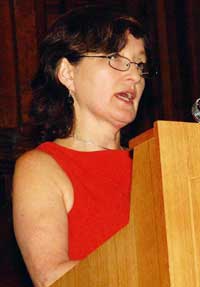23 March 2005 Edition
Inquiries Bill slammed as Finucanes visit US - Cory makes stinging attack on legislation
BY JOANNE CORCORAN

Geraldine Finucane addressed the US House International Relations Committee on Human Rights in Northern Ireland
Last week, the world's media descended on Washington for the White House's St Patrick's Day celebration. News reports were dominated by the attendance of the McCartney family at the event and the absence of the North's political parties.
However, at the same time as the McCartneys were attending packed press conferences, another Irish story was unfolding just yards away on Capitol Hill. The Finucanes were in America to highlight the seriously flawed British Inquiries Bill. This Bill will determine the scope and remit of any future inquiry into the murder of their family member, Pat Finucane, the Belfast human rights solicitor gunned down by loyalists as a result of British collusion in 1989.
The Finucanes received little news coverage, and yet their visit to the US provided some of the week's most noteworthy developments. Firstly, on the day Pat's widow Geraldine addressed the US House International Relations Committee on Human Rights in Northern Ireland, Canadian Judge Peter Cory sent a letter to the Chair of the Committee, Congressman Chris Smith, slamming the Inquiries Bill.
Cory, who was appointed by the Irish and British Governments at Weston Park to determine which cases should be awarded inquiries, described the Bill as creating 'an intolerable Alice in Wonderland situation' and urged fellow Canadian judges to boycott any proposed inquiries under it, should they be approached by the British Government.
His comments were, in the words of Sinn Féin's Gerry Kelly, "hugely significant".
"The British Government has tried to cover up the murder of Pat Finucane and their involvement in it for years," Kelly said on Friday. "It is hugely significant that Judge Cory, whose report forced the British Government into establishing an inquiry, has been so direct in his criticisms."
Trenchant criticism
Cory's withering attack wasn't the only one directed at the British Government. Mitchell Reiss, US envoy to the Six Counties, also addressed the Congressional Committee, and called for the Finucane inquiry to be transparent and have the necessary power to publish the full truth.
"Whatever legislative instrument is used, my concern is that the inquiry has the necessary legal powers to establish the truth of what happened in the Finucane case and that the process has the confidence of the people in Northern Ireland," he said.
"The chair and other members of the inquiry should be fully satisfied that the terms of reference will provide them with the authority necessary to establish the truth and to examine thoroughly the allegations of collusion highlighted by Judge Cory."
On Wednesday evening, Congressman Smith told the BBC's Inside Politics that the British government should scrap the Bill.
So far, the Bill has received nothing but trenchant criticism from all sides but the British. Even the Dublin Government has expressed, if a little quietly, its disdain for the new legislation.
But Tony Blair is showing no sign of bowing to the unanimous pressure at his door.
There are rumours however, that the Bill will be delayed until the other side of the British General Election. As human rights campaigners have pointed out, it's only a matter of time before other families, including British ones, find out that this legislation will impact on inquiries into the deaths of their loved ones.
Letter (edited) from Judge Peter Cory to US Congressional Committee Chair Chris Smith
Dear Chairman Smith:
The proposed legislation pertaining to the public inquiries is unfortunate to say the least. First, it must be remembered that when the Weston Park Accord was signed, the signatories would have had only one concept of a public inquiry, namely, that it would be conducted pursuant to the 1921 Public Inquiry Act.
To change the ground rules at this late date seems unfair. It seems as well unnecessary, since the security of the realm would be ensured by the courts when the issue arose in a true public inquiry.
Further, it seems to me that the proposed new act would make a meaningful inquiry impossible. The commissions would be working in an impossible situation. For example, the Minister, the actions of whose Ministry was to be reviewed by the public inquiry, would have the authority to thwart the efforts of the inquiry at every step. It really creates an intolerable Alice in Wonderland situation.
There have been references in the press to an international judicial membership in the Inquiry. If the new Act were to become law, I would advise all Canadian judges to decline an appointment in light of the impossible situation they would be facing. In fact, I cannot contemplate any self-respecting Canadian judge accepting an appointment to an inquiry constituted under the new proposed act.
Yours sincerely
The Honourable Peter Cory



